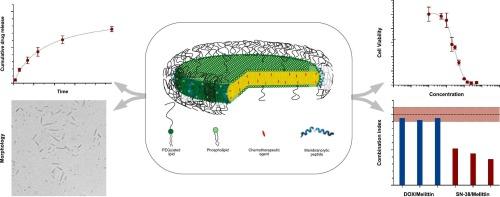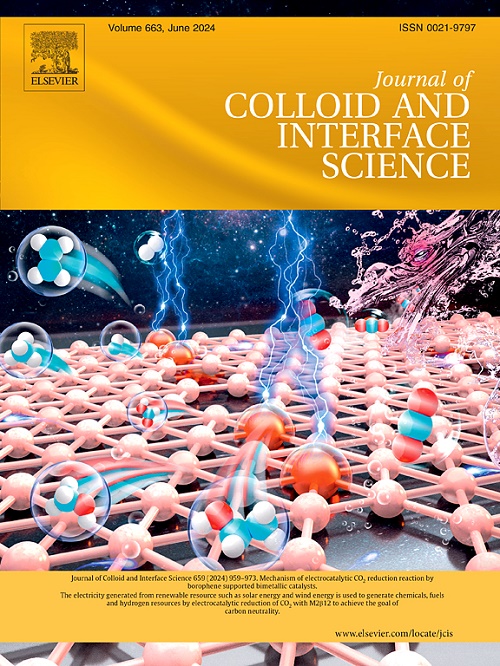用于化疗药物和溶膜抗癌肽共递送的优化脂碟的开发和体外评价
IF 9.7
1区 化学
Q1 CHEMISTRY, PHYSICAL
引用次数: 0
摘要
聚乙二醇(PEG)稳定脂碟是一类新型的、有前途的药物纳米载体。它们的非球形、小尺寸和可变形的形态赋予了它们在血液循环时间、生物分布、肿瘤渗透和免疫行为方面的优势。在这项研究中,我们探索了使用脂碟共同递送膜溶性抗癌肽melittin和化疗药物阿霉素(DOX)或cn -38的潜力和条件。为此,我们制备了单载DOX或SN-38的脂质体,以及双载DOX或SN-38和蜂毒素的脂质体。我们研究了脂质组成的变化如何影响磁盘的载药能力,并确定了对磁盘中抗癌药物保留有重要影响的因素。此外,我们进行细胞研究,以评估和比较单药和双药脂盘的体外细胞毒性作用。这些研究包括旨在探索DOX或SN-38与蜂毒素在同一载体中联合使用可能产生的协同效应的实验。我们的研究结果表明,n -38与蜂毒素共给药可获得明显的协同效应(联合指数(CI)≤0.52),而阿霉素与蜂毒素在普通脂盘载体中联合给药的效果较为温和(CI≤0.95)。总之,我们的研究强调了聚乙二醇稳定的脂碟作为膜溶肽和化疗药物共同递送的有效纳米载体的潜力。总的发现强调了脂盘在药物输送应用中的多功能性和前景。本文章由计算机程序翻译,如有差异,请以英文原文为准。

Development and in vitro evaluation of lipodisks optimized for co-delivery of chemotherapeutic drugs and membranolytic anticancer peptides
Polyethylene glycol (PEG)-stabilized lipodisks constitute a novel and promising class of drug nanocarriers. Their non-spherical shape, small size and deformable morphology confer advantageous features in terms of blood circulation time, biodistribution, tumour penetration and immunological behaviour. In this study, we explore the potential and conditions for using lipodisks for the co-delivery of the membranolytic anticancer peptide melittin and the chemotherapeutic agents doxorubicin (DOX) or SN-38. To this end we prepare lipodisks loaded with DOX or SN-38 alone, as well as lipodisks dually loaded with DOX or SN-38 and melittin. We investigate how variations in the lipodisk lipid composition affects the disk’s drug loading capacity, and identify factors that have an important influence on the retention of the anticancer agents in the disks. Additionally, we conduct cell studies to assess and compare the in vitro cytotoxic effects of the mono and dually drug-loaded lipodisks. These studies include experiments designed to explore possible synergistic effects obtained by combining DOX or SN-38 with melittin in the same carrier. Our results indicate that clear synergistic effects can be obtained by co-delivery of SN-38 and melittin (combination index (CI) ≤ 0.52), while the benefits achieved by combining doxorubicin and melittin in a common lipodisk carrier are more modest (CI ≤ 0.95). In conclusion, our study highlights the potential of PEG-stabilized lipodisks as effective nanocarriers for the co-delivery of membranolytic peptides and chemotherapeutic agents. The overall findings underscore the versatility and promise of lipodisks in drug delivery applications.
求助全文
通过发布文献求助,成功后即可免费获取论文全文。
去求助
来源期刊
CiteScore
16.10
自引率
7.10%
发文量
2568
审稿时长
2 months
期刊介绍:
The Journal of Colloid and Interface Science publishes original research findings on the fundamental principles of colloid and interface science, as well as innovative applications in various fields. The criteria for publication include impact, quality, novelty, and originality.
Emphasis:
The journal emphasizes fundamental scientific innovation within the following categories:
A.Colloidal Materials and Nanomaterials
B.Soft Colloidal and Self-Assembly Systems
C.Adsorption, Catalysis, and Electrochemistry
D.Interfacial Processes, Capillarity, and Wetting
E.Biomaterials and Nanomedicine
F.Energy Conversion and Storage, and Environmental Technologies

 求助内容:
求助内容: 应助结果提醒方式:
应助结果提醒方式:


